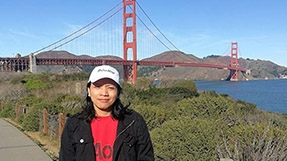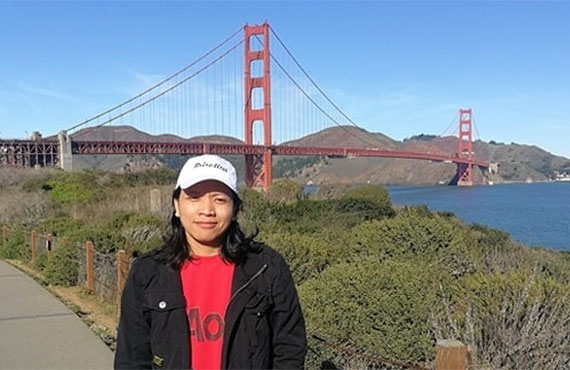Khoury News
Recent Khoury graduate celebrated for creation of data science community
Photo provided by Amel Nestor Docena (MS ’20). Amel Nestor Docena (MS in DS, ‘20) was a self-proclaimed lone wolf when he first arrived at Northeastern University. That was almost […]


Photo provided by Amel Nestor Docena (MS ’20).
Amel Nestor Docena (MS in DS, ‘20) was a self-proclaimed lone wolf when he first arrived at Northeastern University. That was almost two years ago, and things have changed since then. In May, he graduated with not only a freshly minted degree, but the 2020 Khoury Community Service Award as well.
“Amel stands out at Khoury College as being someone who is passionate in ways that extend beyond his own personal and career goals, but are considerate of the growth of the greater community,” said Amorette Colby, a graduate advisor at Khoury College of Computer Sciences.
Although Docena was only a Husky for two years, he made the most of that time, founding the Data Science Hub, a learning community for data science students of all levels. It’s a group based on collaboration, both within the Hub and with other Northeastern clubs and organizations. Docena has high hopes for the organization’s future.
“If this has a strong footing, we can reach out and ask how data science professionals can help with the Northeastern clinic or Northeastern police or Northeastern bookstore,” Docena said. Although he’s graduated, he remains engaged in the group’s endeavors. The Hub was just officially recognized by the university at the beginning of this semester.
Khoury College’s nomination of Docena for the Community Service Award called the Hub a “fantastic initiative that has contributed tremendously to the positive atmosphere in the data science program and the Khoury College community.” It has increased connections and creative ideas among Khoury students, Colby said, and she predicts the group will continue to thrive.
Docena is deeply passionate about data science beyond the Hub. He loves the challenges it presents and the ability to make sense of information that would have otherwise been just a heap of numbers. However, he didn’t discover this enthusiasm until later in life. Docena grew up in Tacloban City, the capital of the province of Leyte in the Philippines. When it came time for higher education, he headed to Manila, the country’s capital, to get an undergraduate degree in business economics. After graduating, he spent a few years working in economics positions. But everything changed the day Docena was given a free pass to a local data summit by an acquaintance.
After attending the summit, Docena was convinced data science and analysis was the future. He set his mind on becoming an expert and, at age 26, chose the Khoury College master’s program in data science because it is welcoming to students who haven’t studied computer or data science before.
“I didn’t know how to code,” Docena recalled. “But, at Khoury, the program was open even to people like me, even to people who are not coming from the field of computer science.”
Docena laughs remembering the learning curve he experienced upon arriving at Northeastern. He jokes that he “really felt the grind.” By his second year, however, Docena had settled in and was involved in NSF-funded research concerning confidentiality and integrity of deep neural network models, specifically detecting integrity violations.[1] (Deep neural networks are a subfield of machine learning inspired by the structure and function of the brain.).
“Amel is a patient person, in a very positive sense,” said Thomas Wahl, Khoury College associate professor and Docena’s research advisor. “You need patience in research because sometimes it can take quite a bit of time before you get good results out of your work. He has a lot of stamina and resilience.”
Docena plans on continuing his data science education with a PhD, either in the United States or Japan (because it is closer to home, he said). Once he has become an expert, Docena dreams of continuing his work serving the community, but far away from Boston.
“Once I have acquired career capital, I’m actually planning on going back to my own country, the Philippines, and helping with nation building,” Docena said. “My country is a developing country, and, right now, organizations are starting to embrace the importance of turning things digital and collecting big data.”
Docena especially wants to address issues of information asymmetry between urban and rural areas. There is plenty of data and information coming from the cities, he said, but very little from smaller communities out in the country. By collecting data from these places, Docena sees potential to improve these communities’ quality of life.
He explained, “There are areas where there isn’t even electricity or kids don’t have access to education or healthcare. People from the capital cities don’t know it because there is just no information.” Commenting on the power of data science, Docena added, “If we can establish the bridge, we could know what the needs of rural communities are and the state of their education and health.”
[1] The three-year research project, “Protecting Confidentiality and Integrity of Deep Neural Networks against Side-Channel and Fault Attacks,” is funded by the NSF under SaTC Core, award number 1929300. Principal investigator is Yunsei Fei, and co-principal investigators are Thomas Wahl and Xue Lin.